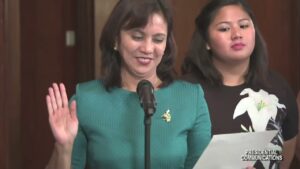In the rich tapestry of Philippine history, certain leaders etch their names not through the force of aggressive influence, vast wealth, or political dynasty, but through a quiet yet unwavering commitment to public service. Among these figures is Maria Leonor “Leni” Santo Tomas Gerona Robredo, a woman from the Bicol region whose gradual ascent from humble roots has transformed her into an enduring symbol of integrity, humility, and profound compassion for the marginalized.
Her journey poses a compelling question to all those in public life: “How much of yourself are you willing to lose just to win?” For Robredo, the answer has consistently been to prioritize principles over power, defining a political career that resonates deeply with the ideals of good governance, social equity, and genuine care for the poor. Today, she is widely known as the former Vice President of the Philippines, a recent presidential candidate, and the current Mayor of Naga City, yet her impact transcends these titles, rooted in values shaped from childhood.

The Foundation: An Early Life of Principle
Born on April 23, 1965, in Naga City, Camarines Sur, Leni Robredo was the eldest daughter of Antonio Gerona, a Regional Trial Court Judge, and Salvacion Santo Tomas, a teacher. This foundation, built on discipline and principled living, saw her excel at the Universidad de Santa Isabel in Naga, where she completed her elementary and high school education. Even at a young age, she demonstrated a sense of responsibility and diligence that would later characterize her public life.
Driven by her parents’ guidance, she pursued higher education at the University of the Philippines Diliman, earning a Bachelor of Arts degree in Economics in 1986—the final year of the Marcos dictatorship. Upon graduation, she returned to Naga and joined the Bicol River Basin Development Program (BRBDP) as a researcher. This role was pivotal; it immersed her in the daily lives of farmers and the region’s urban poor, opening her eyes to the harsh realities faced by ordinary Filipinos. This firsthand exposure fueled her resolve to effect change, leading her to pursue a law degree at the University of Nueva Caceres, which she completed in 1992.
Robredo’s path to becoming a lawyer was marked by persistence. She initially failed the bar examination, but motherhood and other responsibilities did not deter her. Several years later, she successfully passed the Philippine Bar Exam in 1997. This period marked the beginning of her career as an alternative lawyer with Saligan (Sentro ng Alternatibong Lingap Panlegal), a non-governmental organization dedicated to providing free legal aid to farmers, women, and the impoverished. Her work here was not just about legal defense; it was about empowering the basic sectors and championing human rights—a commitment that would become the hallmark of her political philosophy.
Partnership in Governance and Personal Tragedy
In 1987, she married Jesse Robredo, a dynamic and progressive Mayor of Naga City who would later serve as Secretary of the Department of Interior and Local Government (DILG) under the Aquino administration. Together, they raised three daughters—Jessica Marie, Janine Patricia, and Jillian Therese—and became a local symbol of simple, honest, and clean governance. While Jesse focused on municipal leadership, Leni remained the bedrock of their home, actively participating in women’s and community organizations.
Tragedy struck on August 18, 2012, when the plane carrying Jesse Robredo crashed off the coast of Masbate. His death was a personal devastation and a national loss. However, instead of retreating from public life, Leni drew inspiration from her husband’s legacy. As she once stated in an interview, “I had no intention of entering politics, but if this is the way to continue what Jesse started, I am ready to serve.”
From Congress to the Vice Presidency
In 2013, she reluctantly entered the political arena, running for Representative of the Third District of Camarines Sur under the Liberal Party banner. Despite a significant lack of political funds and experience, she won, leveraging her deep connections and sustained engagement with the community. As a Congresswoman, her focus was relentless: she championed the Transparency and Accountability Bill, the People Empowerment Bill (aiming for greater public participation in policy-making), and various laws focused on rural development and women’s empowerment. Her political style was characterized by its accessibility, consultation-based approach, and a focus on service over self-interest.
Her honesty and hard work propelled her onto the national stage. In 2016, she accepted the Liberal Party’s nomination for Vice President. In what proved to be one of the most contentious elections in modern history, she narrowly defeated Ferdinand “Bongbong” Marcos Jr.
As Vice President, Robredo faced the formidable challenge of serving alongside President Rodrigo Duterte, who belonged to a rival political party. Given minimal budget and no cabinet position (save for a brief, tumultuous stint as co-chair of the Inter-Agency Committee on Anti-Illegal Drugs), she reinvented the traditionally ceremonial office into an active, advocacy-driven organization. She spearheaded the Angat Buhay Program, which evolved into the largest anti-poverty initiative ever led by the Office of the Vice President (OVP). This flagship initiative mobilized extensive partnerships with the private sector and non-government organizations, providing essential services in education, health, and livelihood to thousands of marginalized families nationwide.
During the height of the COVID-19 pandemic, the OVP, under Robredo’s leadership, was at the forefront of the national response, deploying initiatives such as the provision of PPEs, shuttle services for frontliners, community learning hubs, and mobile vaccination efforts. Despite its limited budget, the OVP consistently received the highest audit rating from the Commission on Audit (COA) year after year, a testament to its efficiency and impeccable integrity.
While she faced relentless criticism and coordinated disinformation campaigns, she maintained a calm and composed demeanor, responding to attacks with verifiable facts and continued service. Though tension existed with the Duterte administration, particularly over the “War on Drugs,” Robredo remained an unyielding voice against violence and in favor of human rights.
Presidential Run and Continued Advocacy

In the May 2022 elections, Leni Robredo once again stepped forward, running for President on the platform of “Gobyernong Tapat, Angat Buhay Lahat” (An Honest Government, a Better Life for All). Her campaign became historic, mobilizing a vast, passionate grassroots movement of volunteers—youth, teachers, and ordinary citizens—who proudly called themselves her “Kakampinks.” Despite this massive outpouring of support, she lost to Ferdinand Marcos Jr.
Following the election, she quietly accepted the results and transformed the energy of her campaign into sustained action by founding the Angat Buhay Foundation. This non-government organization aims to institutionalize and expand the social projects she championed as Vice President, focusing on the crucial sectors of education, health, and livelihood.
Return to Roots and Mayoral Leadership
After two years dedicated to the foundation, Robredo returned to the political fold in her home city in May 2025, running for and winning the position of Mayor of Naga City by a landslide, making her the city’s first female mayor.
Her first acts in office immediately signaled a return to her core principles. She signed Executive Order No. 001, establishing a Zero Tolerance Policy Against Corruption, aimed at ensuring transparency and accountability in all city transactions. Her vision for Naga City is comprehensive, encapsulated in her “2028 Finish Lines” framework, which includes:
Holistic Urban Planning: Developing flood control systems, dedicated bike lanes, and expanded green public spaces.
Digital Governance: Launching the “May Naga App,” a digital platform to streamline and expedite public services.
Environmental Action: Leading a comprehensive Naga River Rehabilitation Program.
Social Services: Expanding free medicine programs and modernizing the Naga City Hospital.
Performance and Accountability: Implementing a performance review system for all city departments.
Community Empowerment: Creating local councils to ensure meaningful participation from women, youth, and workers.
Her leadership in Naga is viewed not as a national politician demoting herself, but as a daughter of the city returning to uplift the home that raised her.
Leni Robredo’s life is a vivid illustration of tenacity and humility in the pursuit of justice. From a researcher to a lawyer for the poor, a devoted wife of a dedicated public servant, a legislator, a Vice President, and now a Mayor, she has carried the same unwavering spirit of service to others, not to self. She continues to embody the belief that the true measure of a leader’s strength is not the height of their position, but the breadth of the good they achieve for the nation. In the history of the Philippines, she will remain a leader who profoundly lived the truth that leadership is not power, but service.
“Our diversity and difference must never be a barrier to reach out to each other when anyone is in need. The problems we face require building bridges, not walls. They require collaboration, not polarization. We will succeed faster if we include, not exclude. And take note, despite the noise out there, the truth is many are still willing to come together and build bridges.”





